HRM 3 Report: Employee Satisfaction and Career Progression Analysis
VerifiedAdded on 2021/04/16
|21
|7092
|60
Report
AI Summary
This report, focusing on HRM 3, investigates the crucial relationship between career progression and employee satisfaction within the hospitality industry. It begins with an introduction highlighting the importance of employee satisfaction for organizational success and retention in a competitive environment. The report identifies the research problem as employee dissatisfaction during career progression and sets objectives to analyze satisfaction levels and determine the impact of career progression. A comprehensive literature review examines existing research, emphasizing the significance of career progression as an independent variable and employee satisfaction as a dependent variable. The methodology section details the sampling, data collection, and analysis methods used. Findings and discussions cover factors affecting satisfaction, including Maslow's Hierarchy of Needs. The report concludes with recommendations, limitations, and a detailed discussion of the findings, offering valuable insights into enhancing employee satisfaction through effective career progression strategies.
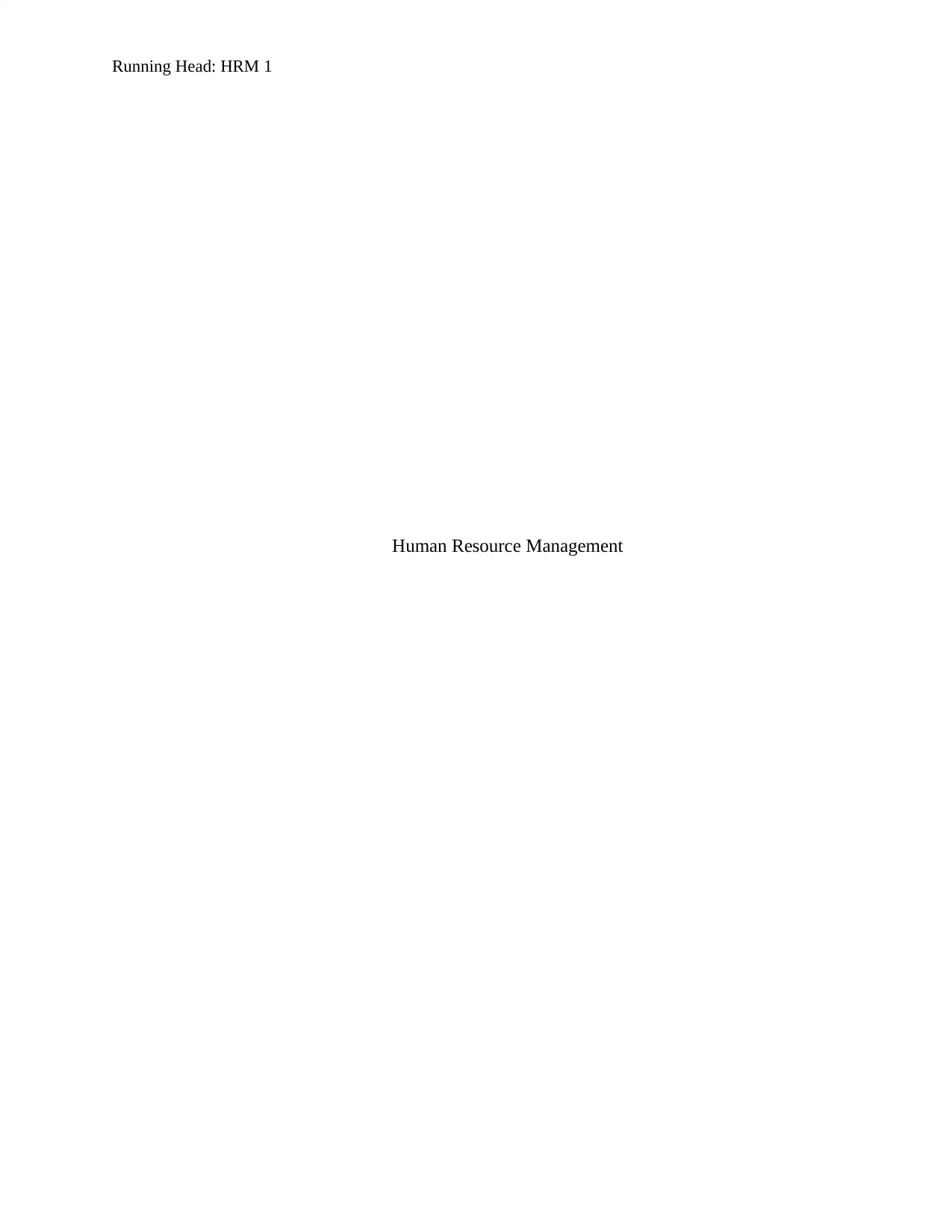
Running Head: HRM 1
Human Resource Management
Human Resource Management
Paraphrase This Document
Need a fresh take? Get an instant paraphrase of this document with our AI Paraphraser
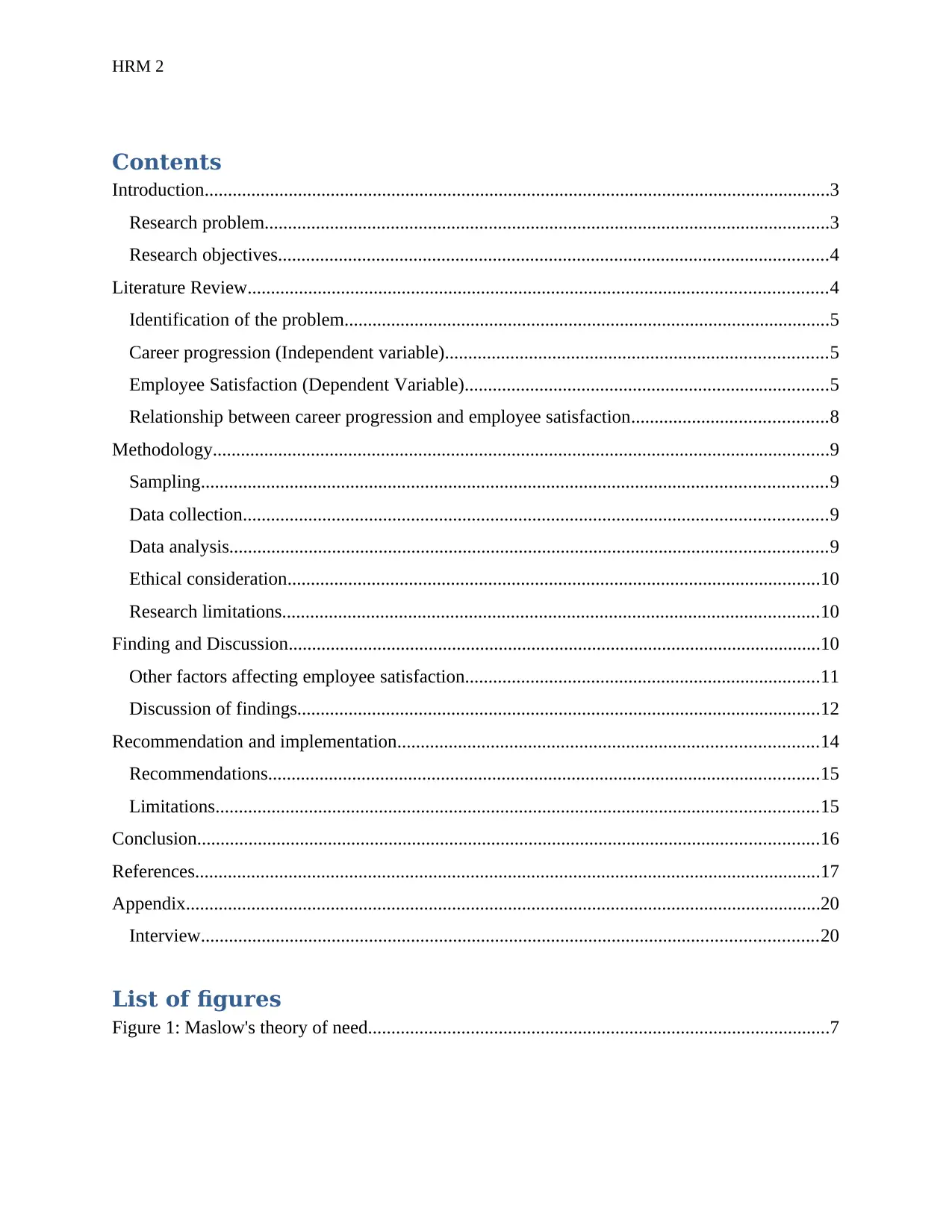
HRM 2
Contents
Introduction......................................................................................................................................3
Research problem.........................................................................................................................3
Research objectives......................................................................................................................4
Literature Review............................................................................................................................4
Identification of the problem........................................................................................................5
Career progression (Independent variable)..................................................................................5
Employee Satisfaction (Dependent Variable)..............................................................................5
Relationship between career progression and employee satisfaction..........................................8
Methodology....................................................................................................................................9
Sampling......................................................................................................................................9
Data collection.............................................................................................................................9
Data analysis................................................................................................................................9
Ethical consideration..................................................................................................................10
Research limitations...................................................................................................................10
Finding and Discussion..................................................................................................................10
Other factors affecting employee satisfaction............................................................................11
Discussion of findings................................................................................................................12
Recommendation and implementation..........................................................................................14
Recommendations......................................................................................................................15
Limitations.................................................................................................................................15
Conclusion.....................................................................................................................................16
References......................................................................................................................................17
Appendix........................................................................................................................................20
Interview....................................................................................................................................20
List of figures
Figure 1: Maslow's theory of need...................................................................................................7
Contents
Introduction......................................................................................................................................3
Research problem.........................................................................................................................3
Research objectives......................................................................................................................4
Literature Review............................................................................................................................4
Identification of the problem........................................................................................................5
Career progression (Independent variable)..................................................................................5
Employee Satisfaction (Dependent Variable)..............................................................................5
Relationship between career progression and employee satisfaction..........................................8
Methodology....................................................................................................................................9
Sampling......................................................................................................................................9
Data collection.............................................................................................................................9
Data analysis................................................................................................................................9
Ethical consideration..................................................................................................................10
Research limitations...................................................................................................................10
Finding and Discussion..................................................................................................................10
Other factors affecting employee satisfaction............................................................................11
Discussion of findings................................................................................................................12
Recommendation and implementation..........................................................................................14
Recommendations......................................................................................................................15
Limitations.................................................................................................................................15
Conclusion.....................................................................................................................................16
References......................................................................................................................................17
Appendix........................................................................................................................................20
Interview....................................................................................................................................20
List of figures
Figure 1: Maslow's theory of need...................................................................................................7
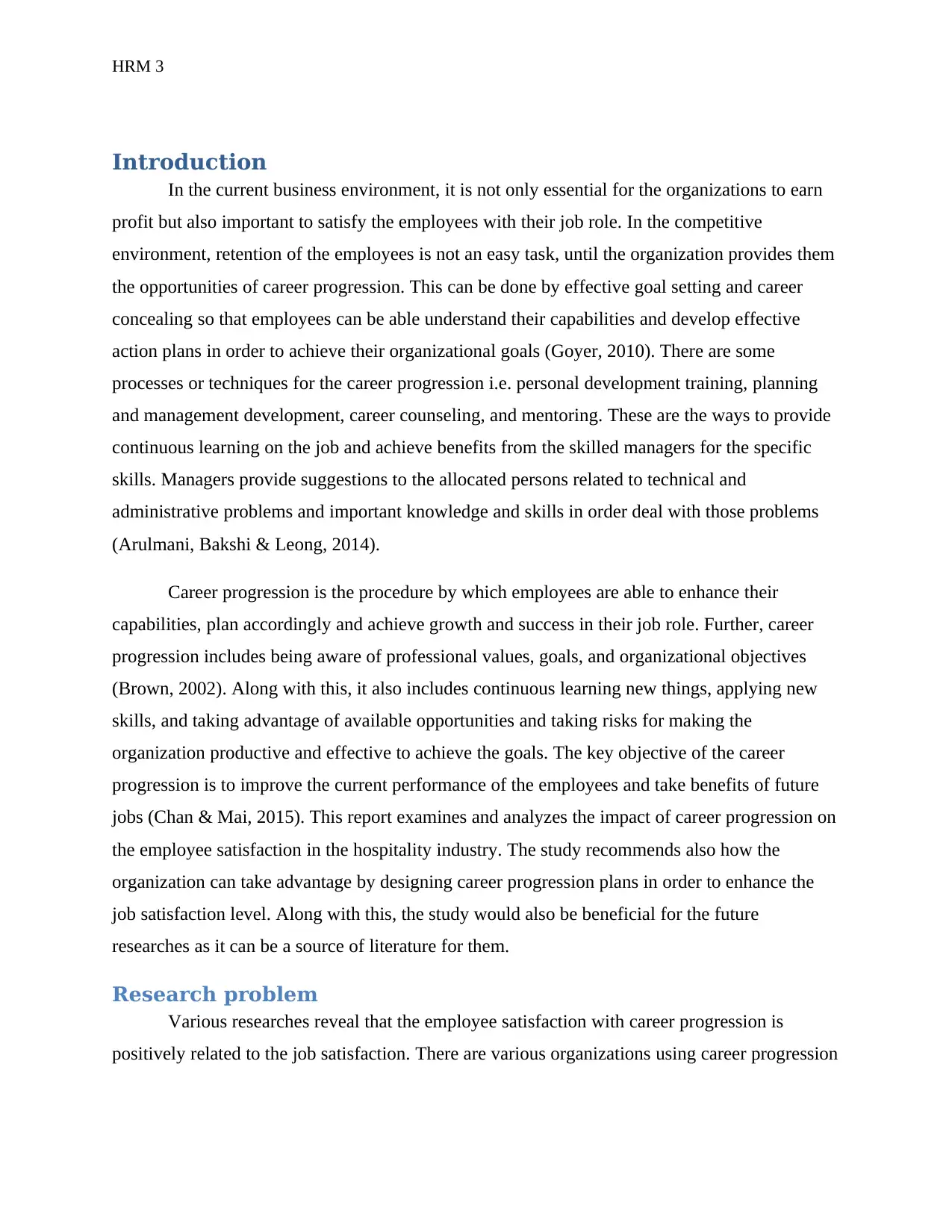
HRM 3
Introduction
In the current business environment, it is not only essential for the organizations to earn
profit but also important to satisfy the employees with their job role. In the competitive
environment, retention of the employees is not an easy task, until the organization provides them
the opportunities of career progression. This can be done by effective goal setting and career
concealing so that employees can be able understand their capabilities and develop effective
action plans in order to achieve their organizational goals (Goyer, 2010). There are some
processes or techniques for the career progression i.e. personal development training, planning
and management development, career counseling, and mentoring. These are the ways to provide
continuous learning on the job and achieve benefits from the skilled managers for the specific
skills. Managers provide suggestions to the allocated persons related to technical and
administrative problems and important knowledge and skills in order deal with those problems
(Arulmani, Bakshi & Leong, 2014).
Career progression is the procedure by which employees are able to enhance their
capabilities, plan accordingly and achieve growth and success in their job role. Further, career
progression includes being aware of professional values, goals, and organizational objectives
(Brown, 2002). Along with this, it also includes continuous learning new things, applying new
skills, and taking advantage of available opportunities and taking risks for making the
organization productive and effective to achieve the goals. The key objective of the career
progression is to improve the current performance of the employees and take benefits of future
jobs (Chan & Mai, 2015). This report examines and analyzes the impact of career progression on
the employee satisfaction in the hospitality industry. The study recommends also how the
organization can take advantage by designing career progression plans in order to enhance the
job satisfaction level. Along with this, the study would also be beneficial for the future
researches as it can be a source of literature for them.
Research problem
Various researches reveal that the employee satisfaction with career progression is
positively related to the job satisfaction. There are various organizations using career progression
Introduction
In the current business environment, it is not only essential for the organizations to earn
profit but also important to satisfy the employees with their job role. In the competitive
environment, retention of the employees is not an easy task, until the organization provides them
the opportunities of career progression. This can be done by effective goal setting and career
concealing so that employees can be able understand their capabilities and develop effective
action plans in order to achieve their organizational goals (Goyer, 2010). There are some
processes or techniques for the career progression i.e. personal development training, planning
and management development, career counseling, and mentoring. These are the ways to provide
continuous learning on the job and achieve benefits from the skilled managers for the specific
skills. Managers provide suggestions to the allocated persons related to technical and
administrative problems and important knowledge and skills in order deal with those problems
(Arulmani, Bakshi & Leong, 2014).
Career progression is the procedure by which employees are able to enhance their
capabilities, plan accordingly and achieve growth and success in their job role. Further, career
progression includes being aware of professional values, goals, and organizational objectives
(Brown, 2002). Along with this, it also includes continuous learning new things, applying new
skills, and taking advantage of available opportunities and taking risks for making the
organization productive and effective to achieve the goals. The key objective of the career
progression is to improve the current performance of the employees and take benefits of future
jobs (Chan & Mai, 2015). This report examines and analyzes the impact of career progression on
the employee satisfaction in the hospitality industry. The study recommends also how the
organization can take advantage by designing career progression plans in order to enhance the
job satisfaction level. Along with this, the study would also be beneficial for the future
researches as it can be a source of literature for them.
Research problem
Various researches reveal that the employee satisfaction with career progression is
positively related to the job satisfaction. There are various organizations using career progression
⊘ This is a preview!⊘
Do you want full access?
Subscribe today to unlock all pages.

Trusted by 1+ million students worldwide
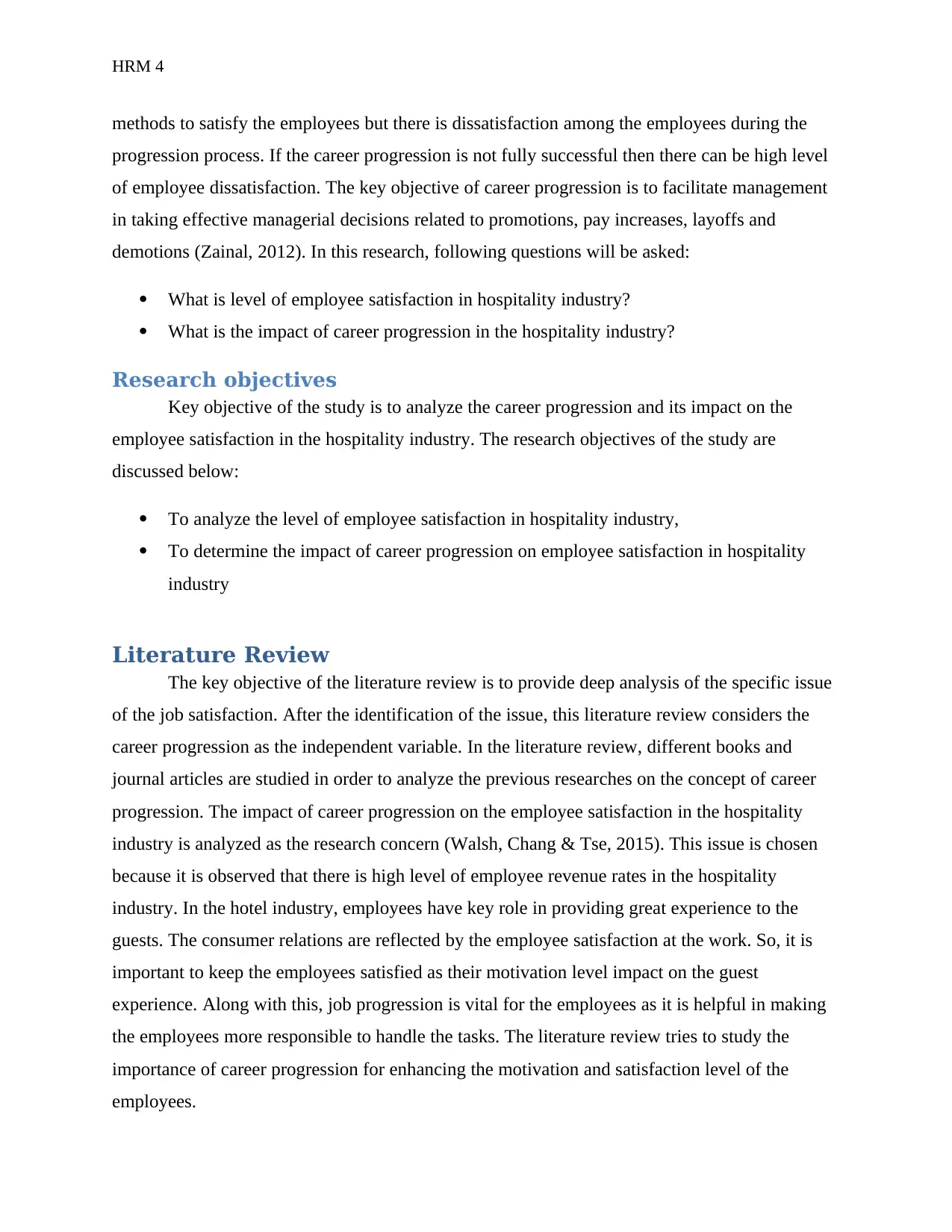
HRM 4
methods to satisfy the employees but there is dissatisfaction among the employees during the
progression process. If the career progression is not fully successful then there can be high level
of employee dissatisfaction. The key objective of career progression is to facilitate management
in taking effective managerial decisions related to promotions, pay increases, layoffs and
demotions (Zainal, 2012). In this research, following questions will be asked:
What is level of employee satisfaction in hospitality industry?
What is the impact of career progression in the hospitality industry?
Research objectives
Key objective of the study is to analyze the career progression and its impact on the
employee satisfaction in the hospitality industry. The research objectives of the study are
discussed below:
To analyze the level of employee satisfaction in hospitality industry,
To determine the impact of career progression on employee satisfaction in hospitality
industry
Literature Review
The key objective of the literature review is to provide deep analysis of the specific issue
of the job satisfaction. After the identification of the issue, this literature review considers the
career progression as the independent variable. In the literature review, different books and
journal articles are studied in order to analyze the previous researches on the concept of career
progression. The impact of career progression on the employee satisfaction in the hospitality
industry is analyzed as the research concern (Walsh, Chang & Tse, 2015). This issue is chosen
because it is observed that there is high level of employee revenue rates in the hospitality
industry. In the hotel industry, employees have key role in providing great experience to the
guests. The consumer relations are reflected by the employee satisfaction at the work. So, it is
important to keep the employees satisfied as their motivation level impact on the guest
experience. Along with this, job progression is vital for the employees as it is helpful in making
the employees more responsible to handle the tasks. The literature review tries to study the
importance of career progression for enhancing the motivation and satisfaction level of the
employees.
methods to satisfy the employees but there is dissatisfaction among the employees during the
progression process. If the career progression is not fully successful then there can be high level
of employee dissatisfaction. The key objective of career progression is to facilitate management
in taking effective managerial decisions related to promotions, pay increases, layoffs and
demotions (Zainal, 2012). In this research, following questions will be asked:
What is level of employee satisfaction in hospitality industry?
What is the impact of career progression in the hospitality industry?
Research objectives
Key objective of the study is to analyze the career progression and its impact on the
employee satisfaction in the hospitality industry. The research objectives of the study are
discussed below:
To analyze the level of employee satisfaction in hospitality industry,
To determine the impact of career progression on employee satisfaction in hospitality
industry
Literature Review
The key objective of the literature review is to provide deep analysis of the specific issue
of the job satisfaction. After the identification of the issue, this literature review considers the
career progression as the independent variable. In the literature review, different books and
journal articles are studied in order to analyze the previous researches on the concept of career
progression. The impact of career progression on the employee satisfaction in the hospitality
industry is analyzed as the research concern (Walsh, Chang & Tse, 2015). This issue is chosen
because it is observed that there is high level of employee revenue rates in the hospitality
industry. In the hotel industry, employees have key role in providing great experience to the
guests. The consumer relations are reflected by the employee satisfaction at the work. So, it is
important to keep the employees satisfied as their motivation level impact on the guest
experience. Along with this, job progression is vital for the employees as it is helpful in making
the employees more responsible to handle the tasks. The literature review tries to study the
importance of career progression for enhancing the motivation and satisfaction level of the
employees.
Paraphrase This Document
Need a fresh take? Get an instant paraphrase of this document with our AI Paraphraser
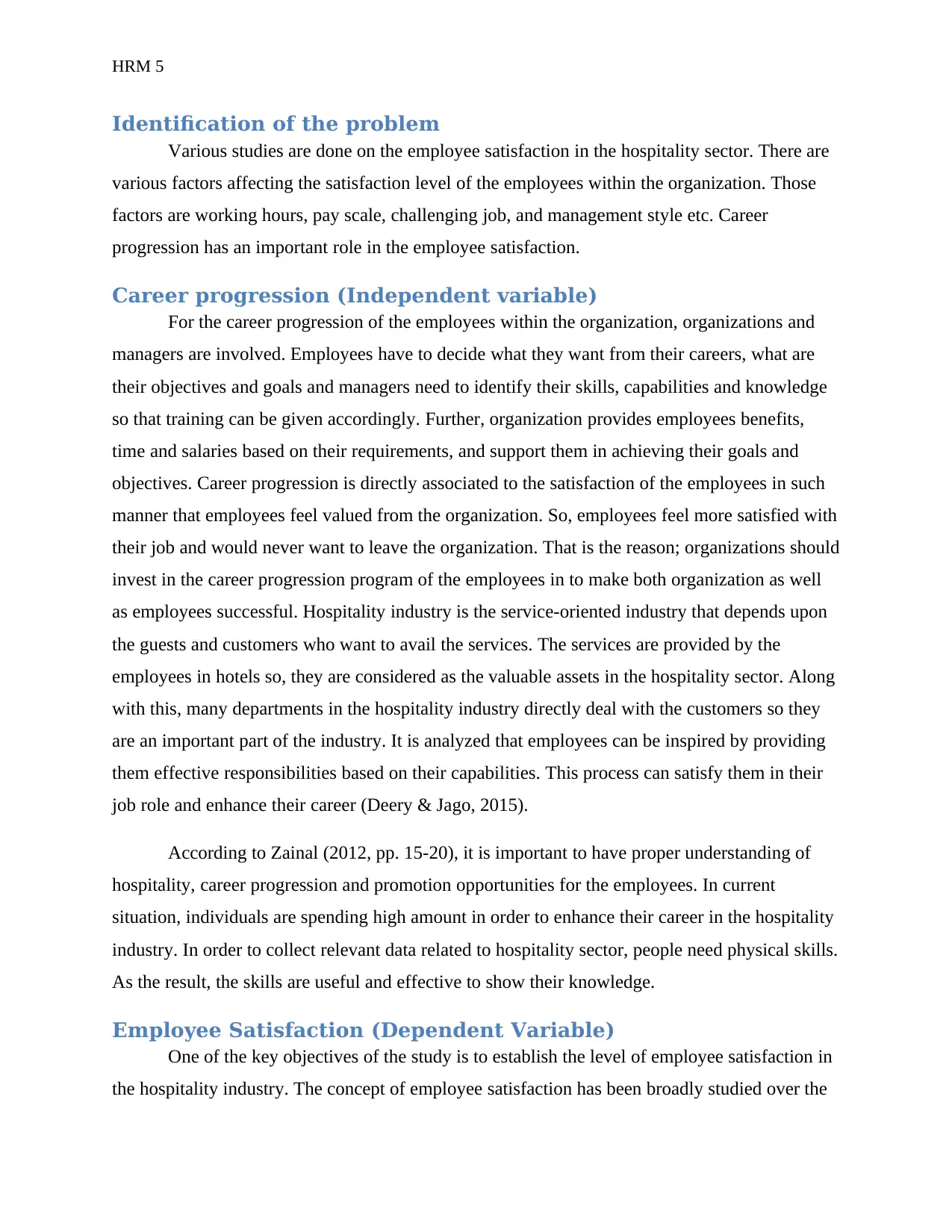
HRM 5
Identification of the problem
Various studies are done on the employee satisfaction in the hospitality sector. There are
various factors affecting the satisfaction level of the employees within the organization. Those
factors are working hours, pay scale, challenging job, and management style etc. Career
progression has an important role in the employee satisfaction.
Career progression (Independent variable)
For the career progression of the employees within the organization, organizations and
managers are involved. Employees have to decide what they want from their careers, what are
their objectives and goals and managers need to identify their skills, capabilities and knowledge
so that training can be given accordingly. Further, organization provides employees benefits,
time and salaries based on their requirements, and support them in achieving their goals and
objectives. Career progression is directly associated to the satisfaction of the employees in such
manner that employees feel valued from the organization. So, employees feel more satisfied with
their job and would never want to leave the organization. That is the reason; organizations should
invest in the career progression program of the employees in to make both organization as well
as employees successful. Hospitality industry is the service-oriented industry that depends upon
the guests and customers who want to avail the services. The services are provided by the
employees in hotels so, they are considered as the valuable assets in the hospitality sector. Along
with this, many departments in the hospitality industry directly deal with the customers so they
are an important part of the industry. It is analyzed that employees can be inspired by providing
them effective responsibilities based on their capabilities. This process can satisfy them in their
job role and enhance their career (Deery & Jago, 2015).
According to Zainal (2012, pp. 15-20), it is important to have proper understanding of
hospitality, career progression and promotion opportunities for the employees. In current
situation, individuals are spending high amount in order to enhance their career in the hospitality
industry. In order to collect relevant data related to hospitality sector, people need physical skills.
As the result, the skills are useful and effective to show their knowledge.
Employee Satisfaction (Dependent Variable)
One of the key objectives of the study is to establish the level of employee satisfaction in
the hospitality industry. The concept of employee satisfaction has been broadly studied over the
Identification of the problem
Various studies are done on the employee satisfaction in the hospitality sector. There are
various factors affecting the satisfaction level of the employees within the organization. Those
factors are working hours, pay scale, challenging job, and management style etc. Career
progression has an important role in the employee satisfaction.
Career progression (Independent variable)
For the career progression of the employees within the organization, organizations and
managers are involved. Employees have to decide what they want from their careers, what are
their objectives and goals and managers need to identify their skills, capabilities and knowledge
so that training can be given accordingly. Further, organization provides employees benefits,
time and salaries based on their requirements, and support them in achieving their goals and
objectives. Career progression is directly associated to the satisfaction of the employees in such
manner that employees feel valued from the organization. So, employees feel more satisfied with
their job and would never want to leave the organization. That is the reason; organizations should
invest in the career progression program of the employees in to make both organization as well
as employees successful. Hospitality industry is the service-oriented industry that depends upon
the guests and customers who want to avail the services. The services are provided by the
employees in hotels so, they are considered as the valuable assets in the hospitality sector. Along
with this, many departments in the hospitality industry directly deal with the customers so they
are an important part of the industry. It is analyzed that employees can be inspired by providing
them effective responsibilities based on their capabilities. This process can satisfy them in their
job role and enhance their career (Deery & Jago, 2015).
According to Zainal (2012, pp. 15-20), it is important to have proper understanding of
hospitality, career progression and promotion opportunities for the employees. In current
situation, individuals are spending high amount in order to enhance their career in the hospitality
industry. In order to collect relevant data related to hospitality sector, people need physical skills.
As the result, the skills are useful and effective to show their knowledge.
Employee Satisfaction (Dependent Variable)
One of the key objectives of the study is to establish the level of employee satisfaction in
the hospitality industry. The concept of employee satisfaction has been broadly studied over the
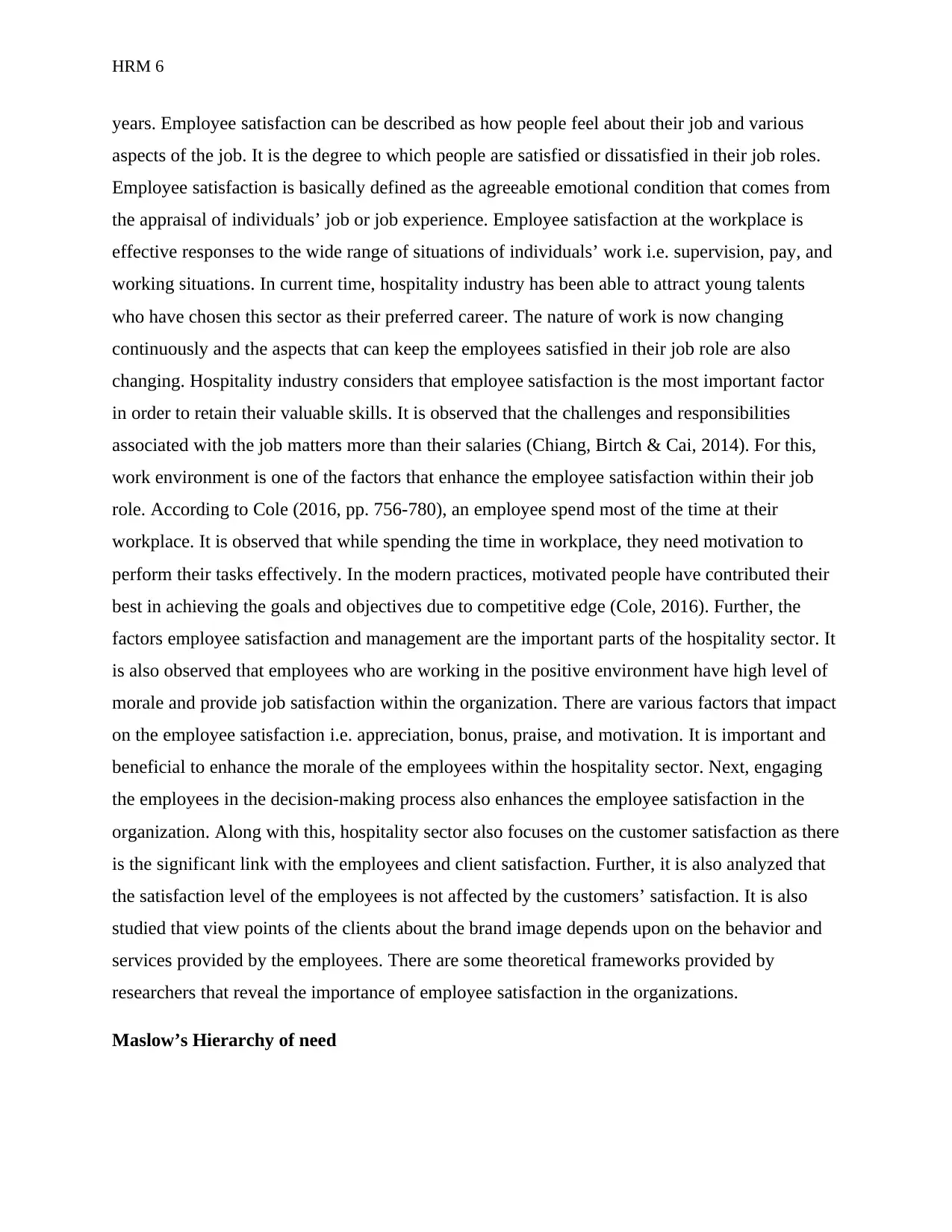
HRM 6
years. Employee satisfaction can be described as how people feel about their job and various
aspects of the job. It is the degree to which people are satisfied or dissatisfied in their job roles.
Employee satisfaction is basically defined as the agreeable emotional condition that comes from
the appraisal of individuals’ job or job experience. Employee satisfaction at the workplace is
effective responses to the wide range of situations of individuals’ work i.e. supervision, pay, and
working situations. In current time, hospitality industry has been able to attract young talents
who have chosen this sector as their preferred career. The nature of work is now changing
continuously and the aspects that can keep the employees satisfied in their job role are also
changing. Hospitality industry considers that employee satisfaction is the most important factor
in order to retain their valuable skills. It is observed that the challenges and responsibilities
associated with the job matters more than their salaries (Chiang, Birtch & Cai, 2014). For this,
work environment is one of the factors that enhance the employee satisfaction within their job
role. According to Cole (2016, pp. 756-780), an employee spend most of the time at their
workplace. It is observed that while spending the time in workplace, they need motivation to
perform their tasks effectively. In the modern practices, motivated people have contributed their
best in achieving the goals and objectives due to competitive edge (Cole, 2016). Further, the
factors employee satisfaction and management are the important parts of the hospitality sector. It
is also observed that employees who are working in the positive environment have high level of
morale and provide job satisfaction within the organization. There are various factors that impact
on the employee satisfaction i.e. appreciation, bonus, praise, and motivation. It is important and
beneficial to enhance the morale of the employees within the hospitality sector. Next, engaging
the employees in the decision-making process also enhances the employee satisfaction in the
organization. Along with this, hospitality sector also focuses on the customer satisfaction as there
is the significant link with the employees and client satisfaction. Further, it is also analyzed that
the satisfaction level of the employees is not affected by the customers’ satisfaction. It is also
studied that view points of the clients about the brand image depends upon on the behavior and
services provided by the employees. There are some theoretical frameworks provided by
researchers that reveal the importance of employee satisfaction in the organizations.
Maslow’s Hierarchy of need
years. Employee satisfaction can be described as how people feel about their job and various
aspects of the job. It is the degree to which people are satisfied or dissatisfied in their job roles.
Employee satisfaction is basically defined as the agreeable emotional condition that comes from
the appraisal of individuals’ job or job experience. Employee satisfaction at the workplace is
effective responses to the wide range of situations of individuals’ work i.e. supervision, pay, and
working situations. In current time, hospitality industry has been able to attract young talents
who have chosen this sector as their preferred career. The nature of work is now changing
continuously and the aspects that can keep the employees satisfied in their job role are also
changing. Hospitality industry considers that employee satisfaction is the most important factor
in order to retain their valuable skills. It is observed that the challenges and responsibilities
associated with the job matters more than their salaries (Chiang, Birtch & Cai, 2014). For this,
work environment is one of the factors that enhance the employee satisfaction within their job
role. According to Cole (2016, pp. 756-780), an employee spend most of the time at their
workplace. It is observed that while spending the time in workplace, they need motivation to
perform their tasks effectively. In the modern practices, motivated people have contributed their
best in achieving the goals and objectives due to competitive edge (Cole, 2016). Further, the
factors employee satisfaction and management are the important parts of the hospitality sector. It
is also observed that employees who are working in the positive environment have high level of
morale and provide job satisfaction within the organization. There are various factors that impact
on the employee satisfaction i.e. appreciation, bonus, praise, and motivation. It is important and
beneficial to enhance the morale of the employees within the hospitality sector. Next, engaging
the employees in the decision-making process also enhances the employee satisfaction in the
organization. Along with this, hospitality sector also focuses on the customer satisfaction as there
is the significant link with the employees and client satisfaction. Further, it is also analyzed that
the satisfaction level of the employees is not affected by the customers’ satisfaction. It is also
studied that view points of the clients about the brand image depends upon on the behavior and
services provided by the employees. There are some theoretical frameworks provided by
researchers that reveal the importance of employee satisfaction in the organizations.
Maslow’s Hierarchy of need
⊘ This is a preview!⊘
Do you want full access?
Subscribe today to unlock all pages.

Trusted by 1+ million students worldwide
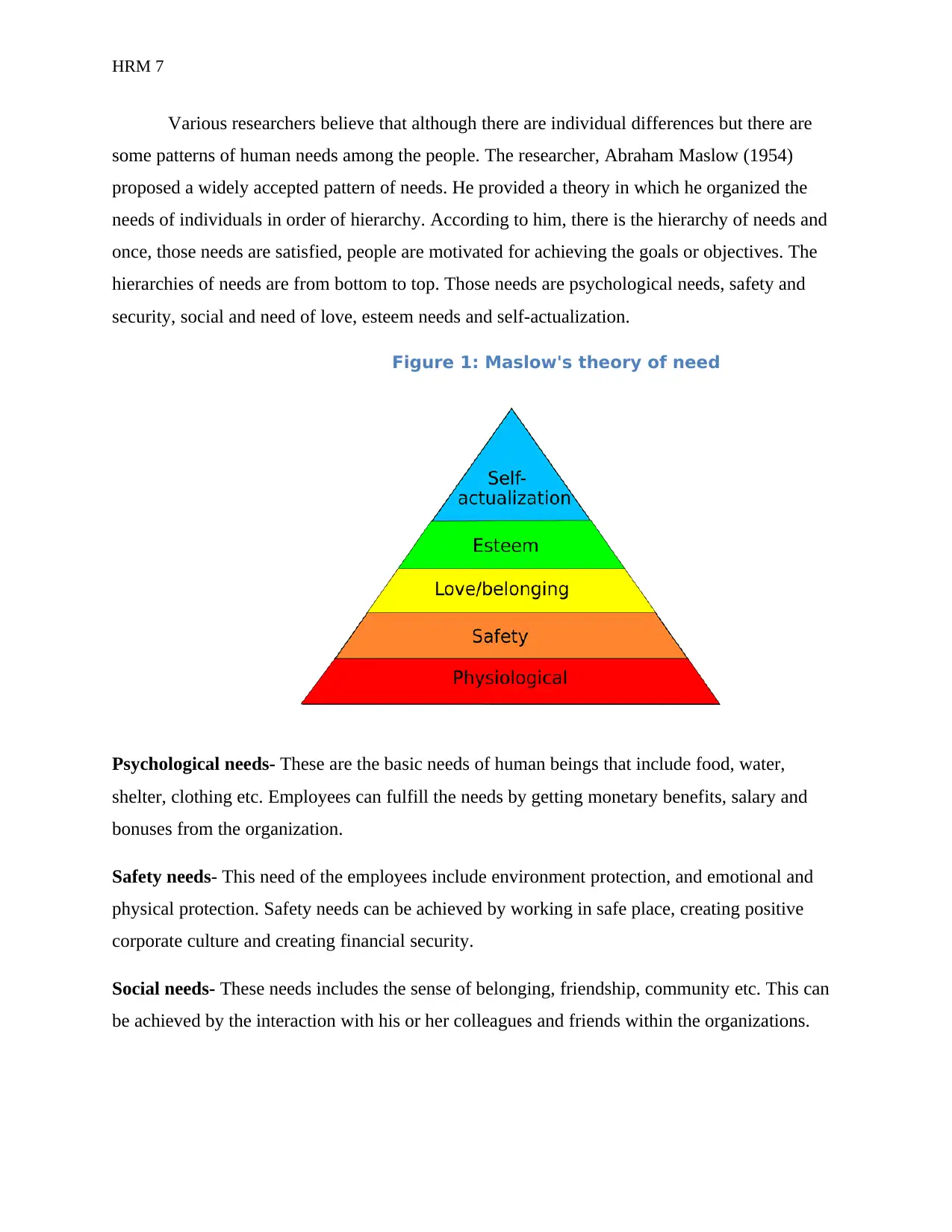
HRM 7
Various researchers believe that although there are individual differences but there are
some patterns of human needs among the people. The researcher, Abraham Maslow (1954)
proposed a widely accepted pattern of needs. He provided a theory in which he organized the
needs of individuals in order of hierarchy. According to him, there is the hierarchy of needs and
once, those needs are satisfied, people are motivated for achieving the goals or objectives. The
hierarchies of needs are from bottom to top. Those needs are psychological needs, safety and
security, social and need of love, esteem needs and self-actualization.
Figure 1: Maslow's theory of need
Psychological needs- These are the basic needs of human beings that include food, water,
shelter, clothing etc. Employees can fulfill the needs by getting monetary benefits, salary and
bonuses from the organization.
Safety needs- This need of the employees include environment protection, and emotional and
physical protection. Safety needs can be achieved by working in safe place, creating positive
corporate culture and creating financial security.
Social needs- These needs includes the sense of belonging, friendship, community etc. This can
be achieved by the interaction with his or her colleagues and friends within the organizations.
Various researchers believe that although there are individual differences but there are
some patterns of human needs among the people. The researcher, Abraham Maslow (1954)
proposed a widely accepted pattern of needs. He provided a theory in which he organized the
needs of individuals in order of hierarchy. According to him, there is the hierarchy of needs and
once, those needs are satisfied, people are motivated for achieving the goals or objectives. The
hierarchies of needs are from bottom to top. Those needs are psychological needs, safety and
security, social and need of love, esteem needs and self-actualization.
Figure 1: Maslow's theory of need
Psychological needs- These are the basic needs of human beings that include food, water,
shelter, clothing etc. Employees can fulfill the needs by getting monetary benefits, salary and
bonuses from the organization.
Safety needs- This need of the employees include environment protection, and emotional and
physical protection. Safety needs can be achieved by working in safe place, creating positive
corporate culture and creating financial security.
Social needs- These needs includes the sense of belonging, friendship, community etc. This can
be achieved by the interaction with his or her colleagues and friends within the organizations.
Paraphrase This Document
Need a fresh take? Get an instant paraphrase of this document with our AI Paraphraser
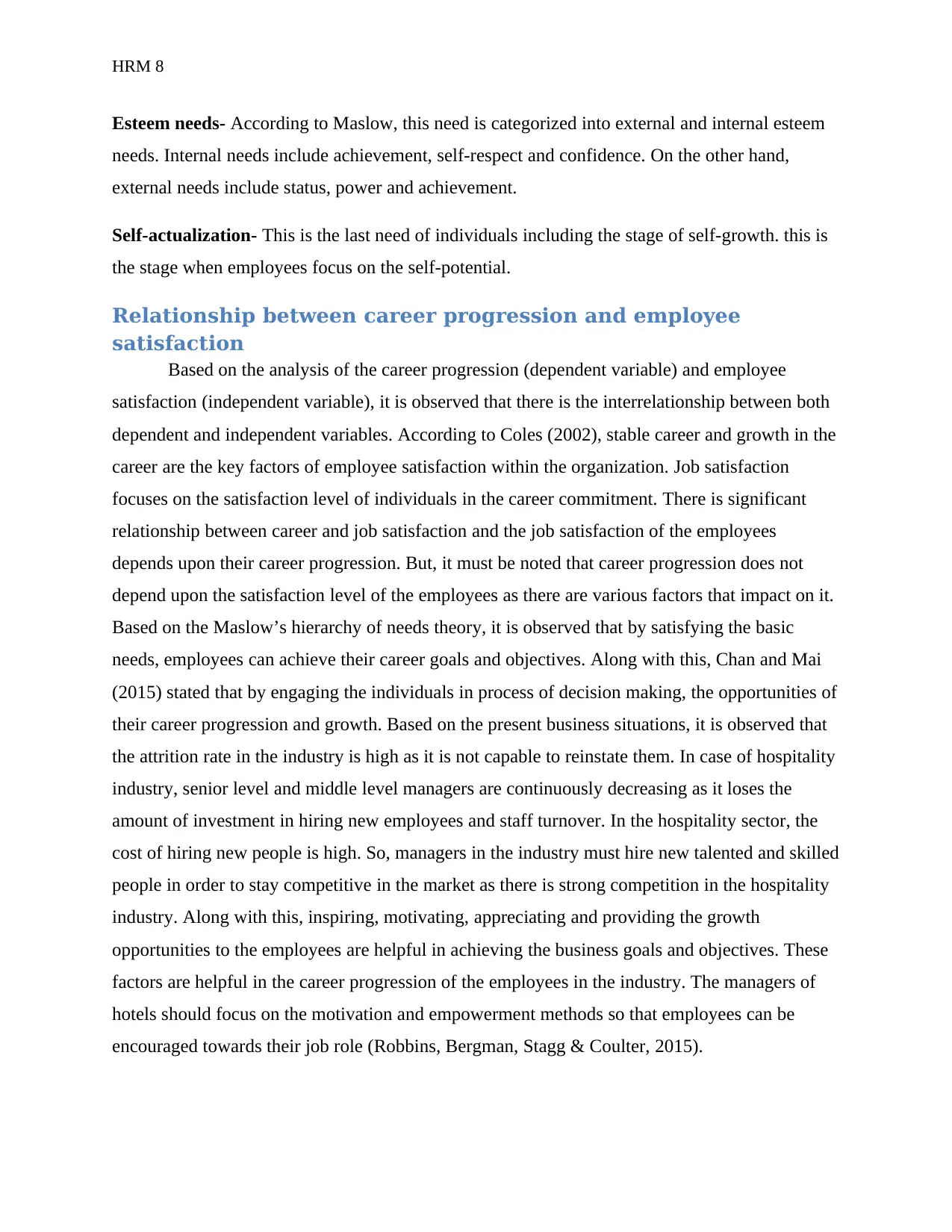
HRM 8
Esteem needs- According to Maslow, this need is categorized into external and internal esteem
needs. Internal needs include achievement, self-respect and confidence. On the other hand,
external needs include status, power and achievement.
Self-actualization- This is the last need of individuals including the stage of self-growth. this is
the stage when employees focus on the self-potential.
Relationship between career progression and employee
satisfaction
Based on the analysis of the career progression (dependent variable) and employee
satisfaction (independent variable), it is observed that there is the interrelationship between both
dependent and independent variables. According to Coles (2002), stable career and growth in the
career are the key factors of employee satisfaction within the organization. Job satisfaction
focuses on the satisfaction level of individuals in the career commitment. There is significant
relationship between career and job satisfaction and the job satisfaction of the employees
depends upon their career progression. But, it must be noted that career progression does not
depend upon the satisfaction level of the employees as there are various factors that impact on it.
Based on the Maslow’s hierarchy of needs theory, it is observed that by satisfying the basic
needs, employees can achieve their career goals and objectives. Along with this, Chan and Mai
(2015) stated that by engaging the individuals in process of decision making, the opportunities of
their career progression and growth. Based on the present business situations, it is observed that
the attrition rate in the industry is high as it is not capable to reinstate them. In case of hospitality
industry, senior level and middle level managers are continuously decreasing as it loses the
amount of investment in hiring new employees and staff turnover. In the hospitality sector, the
cost of hiring new people is high. So, managers in the industry must hire new talented and skilled
people in order to stay competitive in the market as there is strong competition in the hospitality
industry. Along with this, inspiring, motivating, appreciating and providing the growth
opportunities to the employees are helpful in achieving the business goals and objectives. These
factors are helpful in the career progression of the employees in the industry. The managers of
hotels should focus on the motivation and empowerment methods so that employees can be
encouraged towards their job role (Robbins, Bergman, Stagg & Coulter, 2015).
Esteem needs- According to Maslow, this need is categorized into external and internal esteem
needs. Internal needs include achievement, self-respect and confidence. On the other hand,
external needs include status, power and achievement.
Self-actualization- This is the last need of individuals including the stage of self-growth. this is
the stage when employees focus on the self-potential.
Relationship between career progression and employee
satisfaction
Based on the analysis of the career progression (dependent variable) and employee
satisfaction (independent variable), it is observed that there is the interrelationship between both
dependent and independent variables. According to Coles (2002), stable career and growth in the
career are the key factors of employee satisfaction within the organization. Job satisfaction
focuses on the satisfaction level of individuals in the career commitment. There is significant
relationship between career and job satisfaction and the job satisfaction of the employees
depends upon their career progression. But, it must be noted that career progression does not
depend upon the satisfaction level of the employees as there are various factors that impact on it.
Based on the Maslow’s hierarchy of needs theory, it is observed that by satisfying the basic
needs, employees can achieve their career goals and objectives. Along with this, Chan and Mai
(2015) stated that by engaging the individuals in process of decision making, the opportunities of
their career progression and growth. Based on the present business situations, it is observed that
the attrition rate in the industry is high as it is not capable to reinstate them. In case of hospitality
industry, senior level and middle level managers are continuously decreasing as it loses the
amount of investment in hiring new employees and staff turnover. In the hospitality sector, the
cost of hiring new people is high. So, managers in the industry must hire new talented and skilled
people in order to stay competitive in the market as there is strong competition in the hospitality
industry. Along with this, inspiring, motivating, appreciating and providing the growth
opportunities to the employees are helpful in achieving the business goals and objectives. These
factors are helpful in the career progression of the employees in the industry. The managers of
hotels should focus on the motivation and empowerment methods so that employees can be
encouraged towards their job role (Robbins, Bergman, Stagg & Coulter, 2015).
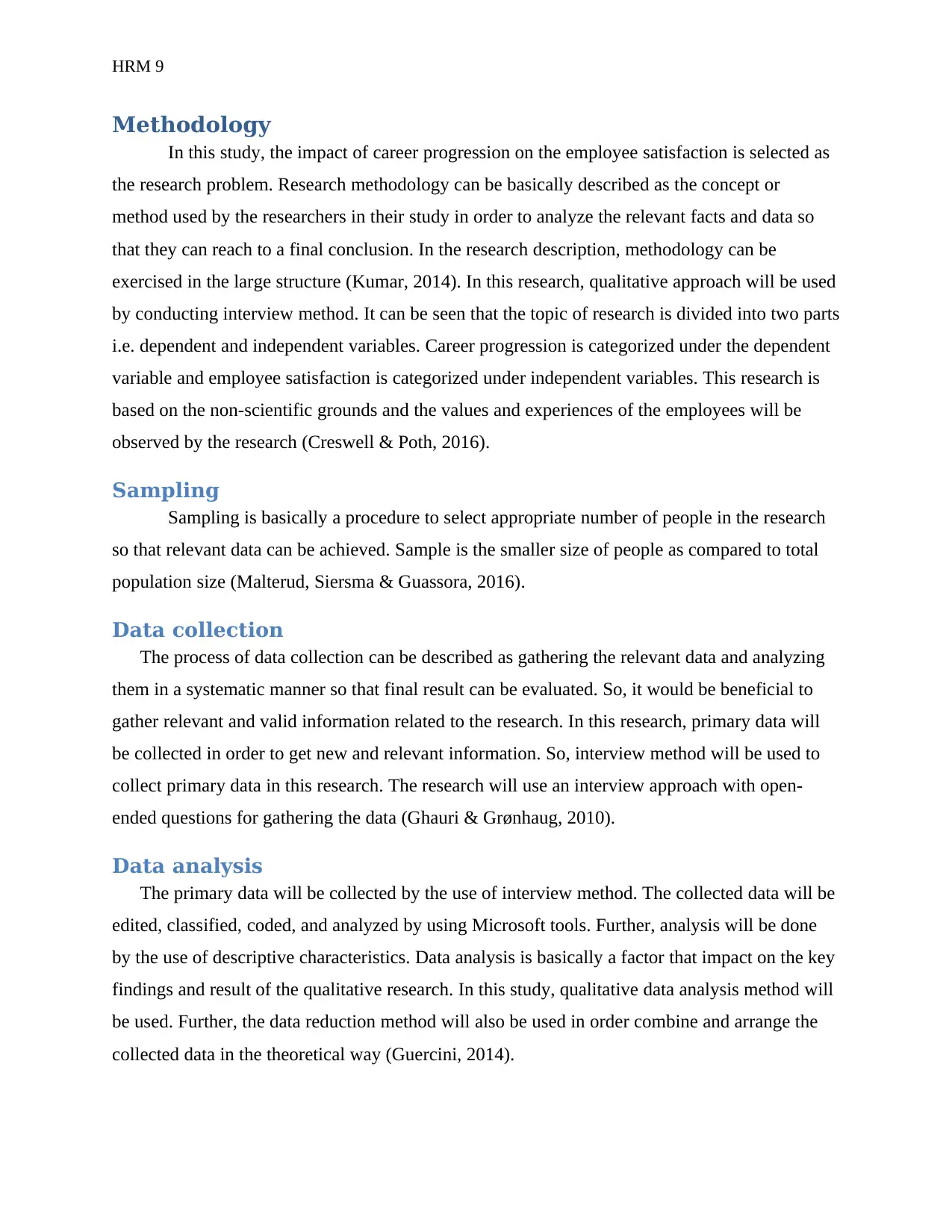
HRM 9
Methodology
In this study, the impact of career progression on the employee satisfaction is selected as
the research problem. Research methodology can be basically described as the concept or
method used by the researchers in their study in order to analyze the relevant facts and data so
that they can reach to a final conclusion. In the research description, methodology can be
exercised in the large structure (Kumar, 2014). In this research, qualitative approach will be used
by conducting interview method. It can be seen that the topic of research is divided into two parts
i.e. dependent and independent variables. Career progression is categorized under the dependent
variable and employee satisfaction is categorized under independent variables. This research is
based on the non-scientific grounds and the values and experiences of the employees will be
observed by the research (Creswell & Poth, 2016).
Sampling
Sampling is basically a procedure to select appropriate number of people in the research
so that relevant data can be achieved. Sample is the smaller size of people as compared to total
population size (Malterud, Siersma & Guassora, 2016).
Data collection
The process of data collection can be described as gathering the relevant data and analyzing
them in a systematic manner so that final result can be evaluated. So, it would be beneficial to
gather relevant and valid information related to the research. In this research, primary data will
be collected in order to get new and relevant information. So, interview method will be used to
collect primary data in this research. The research will use an interview approach with open-
ended questions for gathering the data (Ghauri & Grønhaug, 2010).
Data analysis
The primary data will be collected by the use of interview method. The collected data will be
edited, classified, coded, and analyzed by using Microsoft tools. Further, analysis will be done
by the use of descriptive characteristics. Data analysis is basically a factor that impact on the key
findings and result of the qualitative research. In this study, qualitative data analysis method will
be used. Further, the data reduction method will also be used in order combine and arrange the
collected data in the theoretical way (Guercini, 2014).
Methodology
In this study, the impact of career progression on the employee satisfaction is selected as
the research problem. Research methodology can be basically described as the concept or
method used by the researchers in their study in order to analyze the relevant facts and data so
that they can reach to a final conclusion. In the research description, methodology can be
exercised in the large structure (Kumar, 2014). In this research, qualitative approach will be used
by conducting interview method. It can be seen that the topic of research is divided into two parts
i.e. dependent and independent variables. Career progression is categorized under the dependent
variable and employee satisfaction is categorized under independent variables. This research is
based on the non-scientific grounds and the values and experiences of the employees will be
observed by the research (Creswell & Poth, 2016).
Sampling
Sampling is basically a procedure to select appropriate number of people in the research
so that relevant data can be achieved. Sample is the smaller size of people as compared to total
population size (Malterud, Siersma & Guassora, 2016).
Data collection
The process of data collection can be described as gathering the relevant data and analyzing
them in a systematic manner so that final result can be evaluated. So, it would be beneficial to
gather relevant and valid information related to the research. In this research, primary data will
be collected in order to get new and relevant information. So, interview method will be used to
collect primary data in this research. The research will use an interview approach with open-
ended questions for gathering the data (Ghauri & Grønhaug, 2010).
Data analysis
The primary data will be collected by the use of interview method. The collected data will be
edited, classified, coded, and analyzed by using Microsoft tools. Further, analysis will be done
by the use of descriptive characteristics. Data analysis is basically a factor that impact on the key
findings and result of the qualitative research. In this study, qualitative data analysis method will
be used. Further, the data reduction method will also be used in order combine and arrange the
collected data in the theoretical way (Guercini, 2014).
⊘ This is a preview!⊘
Do you want full access?
Subscribe today to unlock all pages.

Trusted by 1+ million students worldwide
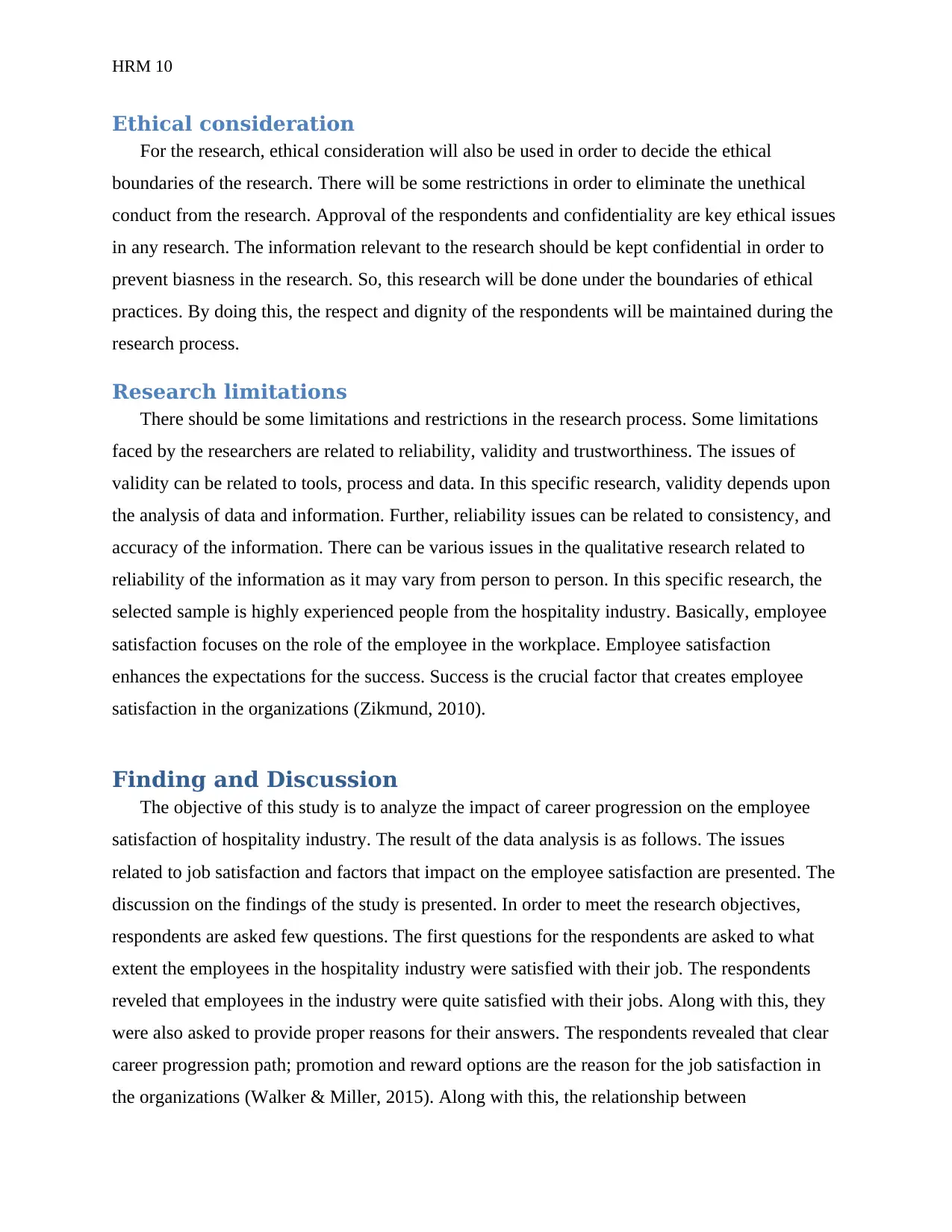
HRM 10
Ethical consideration
For the research, ethical consideration will also be used in order to decide the ethical
boundaries of the research. There will be some restrictions in order to eliminate the unethical
conduct from the research. Approval of the respondents and confidentiality are key ethical issues
in any research. The information relevant to the research should be kept confidential in order to
prevent biasness in the research. So, this research will be done under the boundaries of ethical
practices. By doing this, the respect and dignity of the respondents will be maintained during the
research process.
Research limitations
There should be some limitations and restrictions in the research process. Some limitations
faced by the researchers are related to reliability, validity and trustworthiness. The issues of
validity can be related to tools, process and data. In this specific research, validity depends upon
the analysis of data and information. Further, reliability issues can be related to consistency, and
accuracy of the information. There can be various issues in the qualitative research related to
reliability of the information as it may vary from person to person. In this specific research, the
selected sample is highly experienced people from the hospitality industry. Basically, employee
satisfaction focuses on the role of the employee in the workplace. Employee satisfaction
enhances the expectations for the success. Success is the crucial factor that creates employee
satisfaction in the organizations (Zikmund, 2010).
Finding and Discussion
The objective of this study is to analyze the impact of career progression on the employee
satisfaction of hospitality industry. The result of the data analysis is as follows. The issues
related to job satisfaction and factors that impact on the employee satisfaction are presented. The
discussion on the findings of the study is presented. In order to meet the research objectives,
respondents are asked few questions. The first questions for the respondents are asked to what
extent the employees in the hospitality industry were satisfied with their job. The respondents
reveled that employees in the industry were quite satisfied with their jobs. Along with this, they
were also asked to provide proper reasons for their answers. The respondents revealed that clear
career progression path; promotion and reward options are the reason for the job satisfaction in
the organizations (Walker & Miller, 2015). Along with this, the relationship between
Ethical consideration
For the research, ethical consideration will also be used in order to decide the ethical
boundaries of the research. There will be some restrictions in order to eliminate the unethical
conduct from the research. Approval of the respondents and confidentiality are key ethical issues
in any research. The information relevant to the research should be kept confidential in order to
prevent biasness in the research. So, this research will be done under the boundaries of ethical
practices. By doing this, the respect and dignity of the respondents will be maintained during the
research process.
Research limitations
There should be some limitations and restrictions in the research process. Some limitations
faced by the researchers are related to reliability, validity and trustworthiness. The issues of
validity can be related to tools, process and data. In this specific research, validity depends upon
the analysis of data and information. Further, reliability issues can be related to consistency, and
accuracy of the information. There can be various issues in the qualitative research related to
reliability of the information as it may vary from person to person. In this specific research, the
selected sample is highly experienced people from the hospitality industry. Basically, employee
satisfaction focuses on the role of the employee in the workplace. Employee satisfaction
enhances the expectations for the success. Success is the crucial factor that creates employee
satisfaction in the organizations (Zikmund, 2010).
Finding and Discussion
The objective of this study is to analyze the impact of career progression on the employee
satisfaction of hospitality industry. The result of the data analysis is as follows. The issues
related to job satisfaction and factors that impact on the employee satisfaction are presented. The
discussion on the findings of the study is presented. In order to meet the research objectives,
respondents are asked few questions. The first questions for the respondents are asked to what
extent the employees in the hospitality industry were satisfied with their job. The respondents
reveled that employees in the industry were quite satisfied with their jobs. Along with this, they
were also asked to provide proper reasons for their answers. The respondents revealed that clear
career progression path; promotion and reward options are the reason for the job satisfaction in
the organizations (Walker & Miller, 2015). Along with this, the relationship between
Paraphrase This Document
Need a fresh take? Get an instant paraphrase of this document with our AI Paraphraser
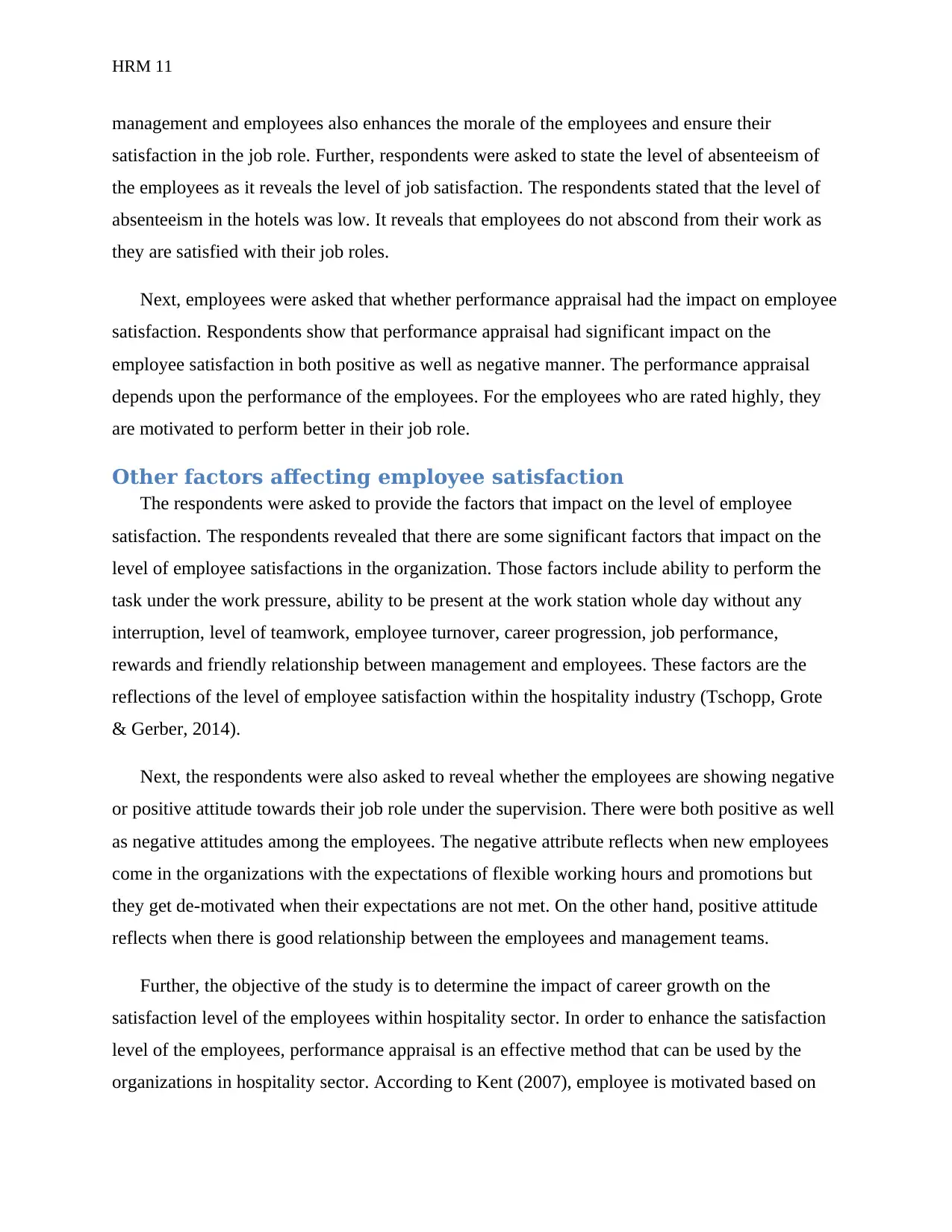
HRM 11
management and employees also enhances the morale of the employees and ensure their
satisfaction in the job role. Further, respondents were asked to state the level of absenteeism of
the employees as it reveals the level of job satisfaction. The respondents stated that the level of
absenteeism in the hotels was low. It reveals that employees do not abscond from their work as
they are satisfied with their job roles.
Next, employees were asked that whether performance appraisal had the impact on employee
satisfaction. Respondents show that performance appraisal had significant impact on the
employee satisfaction in both positive as well as negative manner. The performance appraisal
depends upon the performance of the employees. For the employees who are rated highly, they
are motivated to perform better in their job role.
Other factors affecting employee satisfaction
The respondents were asked to provide the factors that impact on the level of employee
satisfaction. The respondents revealed that there are some significant factors that impact on the
level of employee satisfactions in the organization. Those factors include ability to perform the
task under the work pressure, ability to be present at the work station whole day without any
interruption, level of teamwork, employee turnover, career progression, job performance,
rewards and friendly relationship between management and employees. These factors are the
reflections of the level of employee satisfaction within the hospitality industry (Tschopp, Grote
& Gerber, 2014).
Next, the respondents were also asked to reveal whether the employees are showing negative
or positive attitude towards their job role under the supervision. There were both positive as well
as negative attitudes among the employees. The negative attribute reflects when new employees
come in the organizations with the expectations of flexible working hours and promotions but
they get de-motivated when their expectations are not met. On the other hand, positive attitude
reflects when there is good relationship between the employees and management teams.
Further, the objective of the study is to determine the impact of career growth on the
satisfaction level of the employees within hospitality sector. In order to enhance the satisfaction
level of the employees, performance appraisal is an effective method that can be used by the
organizations in hospitality sector. According to Kent (2007), employee is motivated based on
management and employees also enhances the morale of the employees and ensure their
satisfaction in the job role. Further, respondents were asked to state the level of absenteeism of
the employees as it reveals the level of job satisfaction. The respondents stated that the level of
absenteeism in the hotels was low. It reveals that employees do not abscond from their work as
they are satisfied with their job roles.
Next, employees were asked that whether performance appraisal had the impact on employee
satisfaction. Respondents show that performance appraisal had significant impact on the
employee satisfaction in both positive as well as negative manner. The performance appraisal
depends upon the performance of the employees. For the employees who are rated highly, they
are motivated to perform better in their job role.
Other factors affecting employee satisfaction
The respondents were asked to provide the factors that impact on the level of employee
satisfaction. The respondents revealed that there are some significant factors that impact on the
level of employee satisfactions in the organization. Those factors include ability to perform the
task under the work pressure, ability to be present at the work station whole day without any
interruption, level of teamwork, employee turnover, career progression, job performance,
rewards and friendly relationship between management and employees. These factors are the
reflections of the level of employee satisfaction within the hospitality industry (Tschopp, Grote
& Gerber, 2014).
Next, the respondents were also asked to reveal whether the employees are showing negative
or positive attitude towards their job role under the supervision. There were both positive as well
as negative attitudes among the employees. The negative attribute reflects when new employees
come in the organizations with the expectations of flexible working hours and promotions but
they get de-motivated when their expectations are not met. On the other hand, positive attitude
reflects when there is good relationship between the employees and management teams.
Further, the objective of the study is to determine the impact of career growth on the
satisfaction level of the employees within hospitality sector. In order to enhance the satisfaction
level of the employees, performance appraisal is an effective method that can be used by the
organizations in hospitality sector. According to Kent (2007), employee is motivated based on
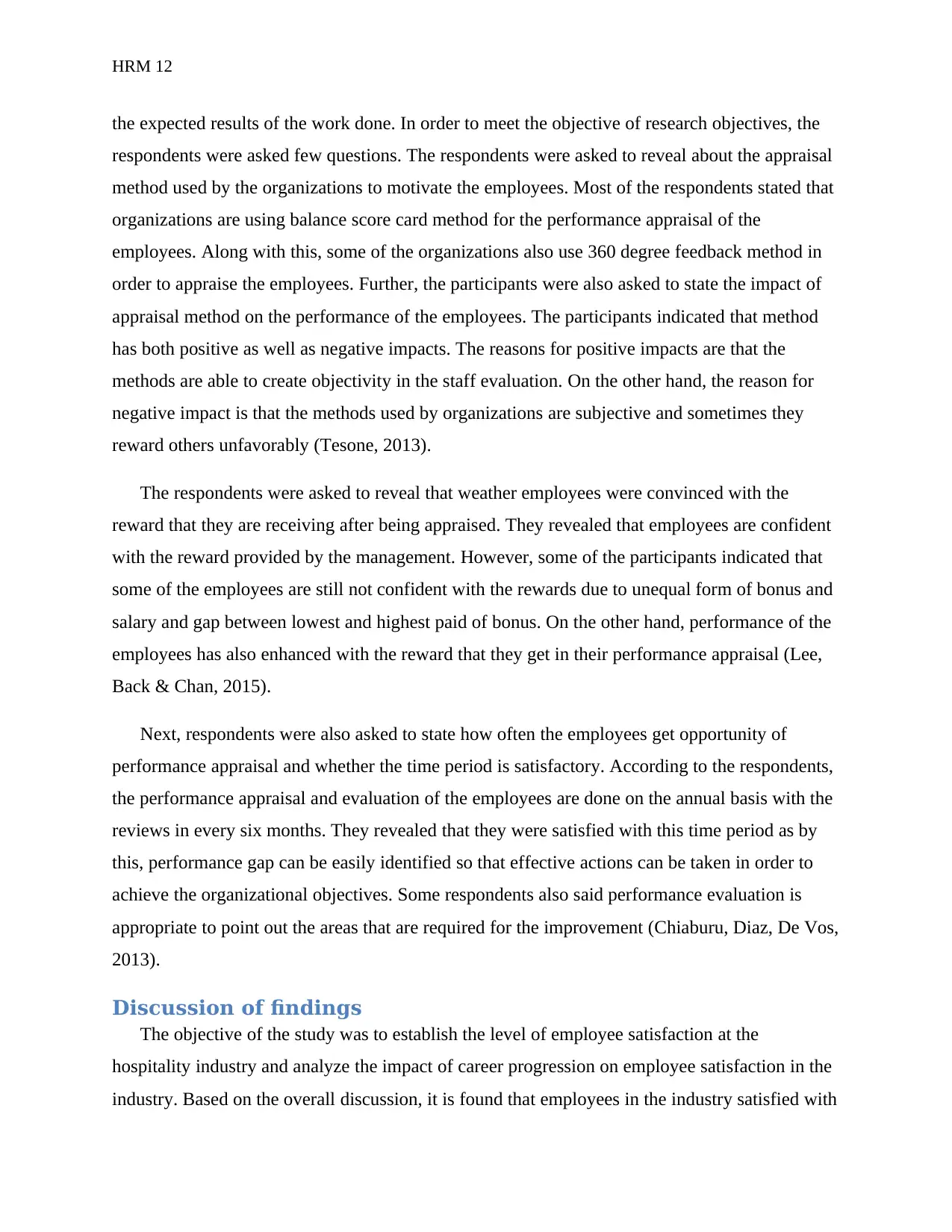
HRM 12
the expected results of the work done. In order to meet the objective of research objectives, the
respondents were asked few questions. The respondents were asked to reveal about the appraisal
method used by the organizations to motivate the employees. Most of the respondents stated that
organizations are using balance score card method for the performance appraisal of the
employees. Along with this, some of the organizations also use 360 degree feedback method in
order to appraise the employees. Further, the participants were also asked to state the impact of
appraisal method on the performance of the employees. The participants indicated that method
has both positive as well as negative impacts. The reasons for positive impacts are that the
methods are able to create objectivity in the staff evaluation. On the other hand, the reason for
negative impact is that the methods used by organizations are subjective and sometimes they
reward others unfavorably (Tesone, 2013).
The respondents were asked to reveal that weather employees were convinced with the
reward that they are receiving after being appraised. They revealed that employees are confident
with the reward provided by the management. However, some of the participants indicated that
some of the employees are still not confident with the rewards due to unequal form of bonus and
salary and gap between lowest and highest paid of bonus. On the other hand, performance of the
employees has also enhanced with the reward that they get in their performance appraisal (Lee,
Back & Chan, 2015).
Next, respondents were also asked to state how often the employees get opportunity of
performance appraisal and whether the time period is satisfactory. According to the respondents,
the performance appraisal and evaluation of the employees are done on the annual basis with the
reviews in every six months. They revealed that they were satisfied with this time period as by
this, performance gap can be easily identified so that effective actions can be taken in order to
achieve the organizational objectives. Some respondents also said performance evaluation is
appropriate to point out the areas that are required for the improvement (Chiaburu, Diaz, De Vos,
2013).
Discussion of findings
The objective of the study was to establish the level of employee satisfaction at the
hospitality industry and analyze the impact of career progression on employee satisfaction in the
industry. Based on the overall discussion, it is found that employees in the industry satisfied with
the expected results of the work done. In order to meet the objective of research objectives, the
respondents were asked few questions. The respondents were asked to reveal about the appraisal
method used by the organizations to motivate the employees. Most of the respondents stated that
organizations are using balance score card method for the performance appraisal of the
employees. Along with this, some of the organizations also use 360 degree feedback method in
order to appraise the employees. Further, the participants were also asked to state the impact of
appraisal method on the performance of the employees. The participants indicated that method
has both positive as well as negative impacts. The reasons for positive impacts are that the
methods are able to create objectivity in the staff evaluation. On the other hand, the reason for
negative impact is that the methods used by organizations are subjective and sometimes they
reward others unfavorably (Tesone, 2013).
The respondents were asked to reveal that weather employees were convinced with the
reward that they are receiving after being appraised. They revealed that employees are confident
with the reward provided by the management. However, some of the participants indicated that
some of the employees are still not confident with the rewards due to unequal form of bonus and
salary and gap between lowest and highest paid of bonus. On the other hand, performance of the
employees has also enhanced with the reward that they get in their performance appraisal (Lee,
Back & Chan, 2015).
Next, respondents were also asked to state how often the employees get opportunity of
performance appraisal and whether the time period is satisfactory. According to the respondents,
the performance appraisal and evaluation of the employees are done on the annual basis with the
reviews in every six months. They revealed that they were satisfied with this time period as by
this, performance gap can be easily identified so that effective actions can be taken in order to
achieve the organizational objectives. Some respondents also said performance evaluation is
appropriate to point out the areas that are required for the improvement (Chiaburu, Diaz, De Vos,
2013).
Discussion of findings
The objective of the study was to establish the level of employee satisfaction at the
hospitality industry and analyze the impact of career progression on employee satisfaction in the
industry. Based on the overall discussion, it is found that employees in the industry satisfied with
⊘ This is a preview!⊘
Do you want full access?
Subscribe today to unlock all pages.

Trusted by 1+ million students worldwide
1 out of 21
Related Documents
Your All-in-One AI-Powered Toolkit for Academic Success.
+13062052269
info@desklib.com
Available 24*7 on WhatsApp / Email
![[object Object]](/_next/static/media/star-bottom.7253800d.svg)
Unlock your academic potential
Copyright © 2020–2026 A2Z Services. All Rights Reserved. Developed and managed by ZUCOL.




